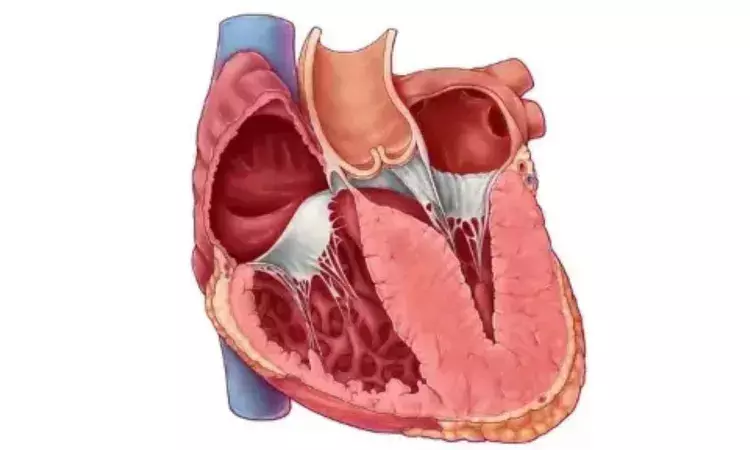- Home
- Medical news & Guidelines
- Anesthesiology
- Cardiology and CTVS
- Critical Care
- Dentistry
- Dermatology
- Diabetes and Endocrinology
- ENT
- Gastroenterology
- Medicine
- Nephrology
- Neurology
- Obstretics-Gynaecology
- Oncology
- Ophthalmology
- Orthopaedics
- Pediatrics-Neonatology
- Psychiatry
- Pulmonology
- Radiology
- Surgery
- Urology
- Laboratory Medicine
- Diet
- Nursing
- Paramedical
- Physiotherapy
- Health news
- Fact Check
- Bone Health Fact Check
- Brain Health Fact Check
- Cancer Related Fact Check
- Child Care Fact Check
- Dental and oral health fact check
- Diabetes and metabolic health fact check
- Diet and Nutrition Fact Check
- Eye and ENT Care Fact Check
- Fitness fact check
- Gut health fact check
- Heart health fact check
- Kidney health fact check
- Medical education fact check
- Men's health fact check
- Respiratory fact check
- Skin and hair care fact check
- Vaccine and Immunization fact check
- Women's health fact check
- AYUSH
- State News
- Andaman and Nicobar Islands
- Andhra Pradesh
- Arunachal Pradesh
- Assam
- Bihar
- Chandigarh
- Chattisgarh
- Dadra and Nagar Haveli
- Daman and Diu
- Delhi
- Goa
- Gujarat
- Haryana
- Himachal Pradesh
- Jammu & Kashmir
- Jharkhand
- Karnataka
- Kerala
- Ladakh
- Lakshadweep
- Madhya Pradesh
- Maharashtra
- Manipur
- Meghalaya
- Mizoram
- Nagaland
- Odisha
- Puducherry
- Punjab
- Rajasthan
- Sikkim
- Tamil Nadu
- Telangana
- Tripura
- Uttar Pradesh
- Uttrakhand
- West Bengal
- Medical Education
- Industry
Implantable Cardioverter-Defibrillator fails to reduce all cause mortality among patients with chronic Chagas cardiomyopathy: JAMA

Implantable Cardioverter-Defibrillator fails to reduce all cause mortality among patients with chronic Chagas cardiomyopathy suggests a study published in the JAMA.
Over 10 000 people with Chagas disease experience sudden cardiac death (SCD) annually, mostly caused by ventricular fibrillation. Amiodarone hydrochloride and the implantable cardioverter-defibrillator (ICD) have been empirically used to prevent SCD in patients with chronic Chagas cardiomyopathy. A study was done to test the hypothesis that ICD is more effective than amiodarone therapy for primary prevention of all-cause mortality in patients with chronic Chagas cardiomyopathy and moderate to high mortality risk, assessed by the Rassi score. CHAGASICS is an open-label, randomized clinical trial.
The study enrolled patients from 13 centers in Brazil from May 30, 2014, to August 13, 2021, with the last follow-up November 8, 2021. Patients with serological findings positive for Chagas disease, a Rassi risk score of at least 10 points (intermediate to high risk), and at least 1 episode of nonsustained ventricular tachycardia were eligible to participate. Data were analyzed from May 3, 2022, to June 16, 2023. Patients were randomized 1:1 to receive ICD or amiodarone (with a loading dose of 600 mg after randomization).
The primary outcome was all-cause mortality, and secondary outcomes included SCD, hospitalization for heart failure, and necessity of a pacemaker during the entire follow-up. Results The study was stopped prematurely for administrative reasons, with 323 patients randomized (166 in the amiodarone group and 157 in the ICD group), rather than the intended 1100 patients. Analysis was by intention to treat at a median follow-up of 3.6 (IQR, 1.8-4.4) years. Mean (SD) age was 57.4 (9.8) years, 185 patients (57.3%) were male, and the mean (SD) left ventricular ejection fraction was 37.0% (11.6%). There were 60 deaths (38.2%) in the ICD arm and 64 (38.6%) in the amiodarone group (hazard ratio [HR], 0.86 [95% CI, 0.60-1.22]; P = .40).
The rates of SCD (6 [3.8%] vs 23 [13.9%]; HR, 0.25 [95% CI, 0.10-0.61]; P = .001), bradycardia requiring pacing (3 [1.9%] vs 27 [16.3%]; HR, 0.10 [95% CI, 0.03-0.34]; P < .001), and heart failure hospitalization (14 [8.9%] vs 28 [16.9%]; HR, 0.46 [95% CI, 0.24-0.87]; P = .01) were lower in the ICD group compared with the amiodarone arm. In patients with chronic Chagas cardiomyopathy at moderate to high risk of mortality, ICD did not reduce the risk of all-cause mortality. However, ICD significantly reduced the risk of SCD, pacing need, and heart failure hospitalization compared with amiodarone therapy. Further studies are warranted to confirm the evidence generated by this trial.
Reference:
Martinelli-Filho M, Marin-Neto JA, Scanavacca MI, et al. Amiodarone or Implantable Cardioverter-Defibrillator in Chagas Cardiomyopathy: The CHAGASICS Randomized Clinical Trial. JAMA Cardiol. Published online October 02, 2024. doi:10.1001/jamacardio.2024.3169
Dr. Shravani Dali has completed her BDS from Pravara institute of medical sciences, loni. Following which she extensively worked in the healthcare sector for 2+ years. She has been actively involved in writing blogs in field of health and wellness. Currently she is pursuing her Masters of public health-health administration from Tata institute of social sciences. She can be contacted at editorial@medicaldialogues.in.
Dr Kamal Kant Kohli-MBBS, DTCD- a chest specialist with more than 30 years of practice and a flair for writing clinical articles, Dr Kamal Kant Kohli joined Medical Dialogues as a Chief Editor of Medical News. Besides writing articles, as an editor, he proofreads and verifies all the medical content published on Medical Dialogues including those coming from journals, studies,medical conferences,guidelines etc. Email: drkohli@medicaldialogues.in. Contact no. 011-43720751


